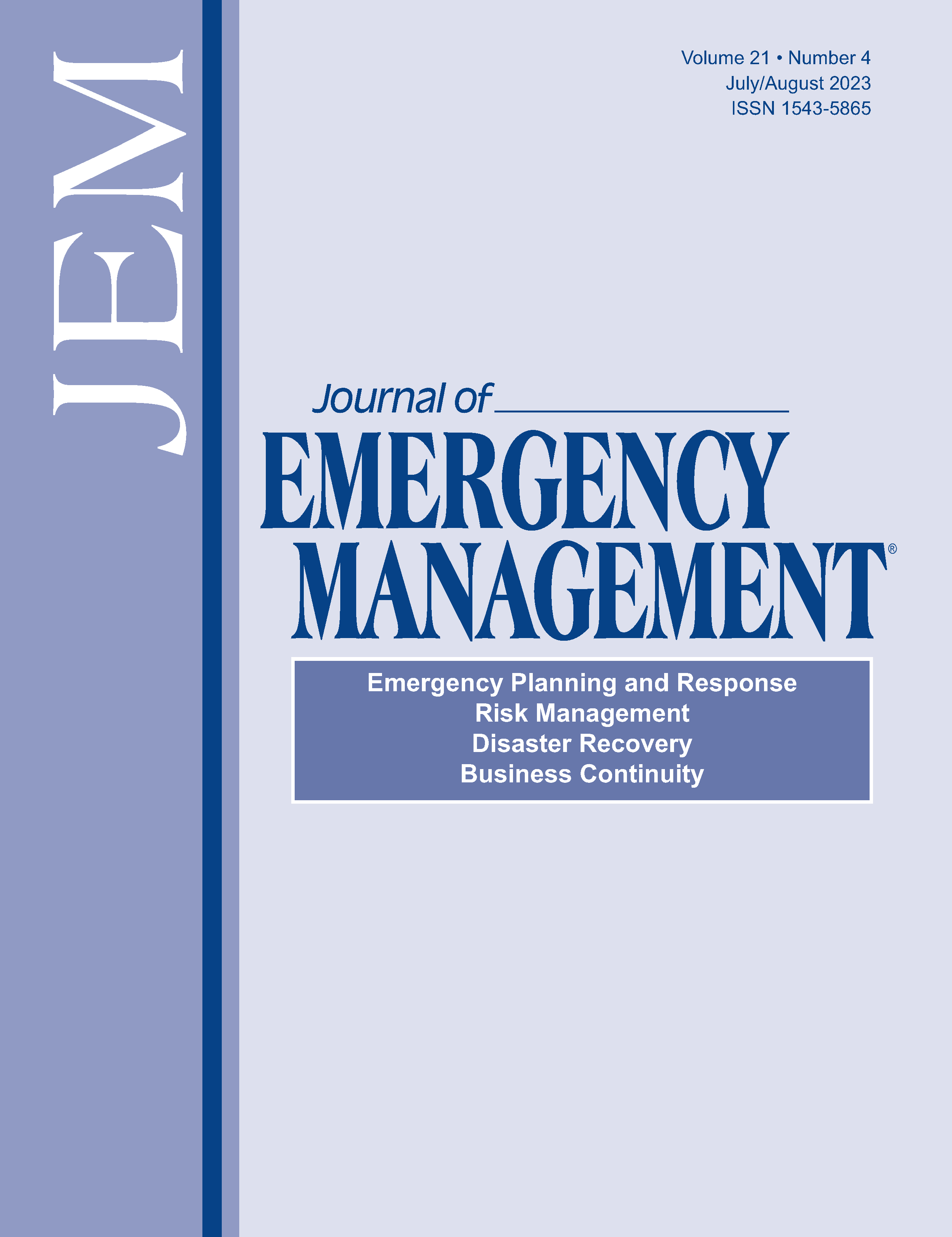Empowering local response and community-based disaster mitigation through legislative policies: Lessons from the Kerala floods of 2018-19
DOI:
https://doi.org/10.5055/jem.0766Keywords:
local response, civic engagement, community resilience, disaster governance policyAbstract
The present paper draws on a series of qualitative studies exploring civic response and community resilience post the 2018-19 floods in Kerala, India. Data were triangulated from multiple sources and perspectives—community leaders and key informants, rescue and relief volunteers, and survivors. This viewpoint paper aims to highlight the critical role of local volunteerism in disaster mitigation and preparedness, the cost of gaps in emboldening community response, and to suggest actionable means of maximizing civilian potential through legislative policies. The local populace are the first responders at disaster sites and play a vital role in disaster mitigation. Knowledge about local geography, community, and readily accessible resources enables community members to respond efficiently, unlike state deployed disaster task forces who need to be scaffolded into these sites. Liaisons between the state and civilian responders are necessary for informed and time-efficient response. Insights gleaned from interviews with the participants offer several suggestions for streamlining administrative channels and structural reforms in governance. Community response can be emboldened by adopting policies that formalize civilian participation in the state’s disaster mitigation systems. Decentralization of authority to local self-governance bodies and acknowledgment of local expertise is key to fostering disaster resilient communities. This paper argues that empowering local stakeholders through legislative reforms can bridge existing gaps between community-action focused research recommendations and policy in practice. It provides a framework and actionable measures toward actualizing the call for society-inclusive disaster risk reduction practices.
References
McNamara KE, Buggy L: Community-based climate change adaptation: A review of academic literature. Local Environ. 2017; 22(4): 443-460. DOI: 10.1080/13549839.2016.1216954.
Jillson IA, Clarke M, Allen C, et al.: Improving the science and evidence base of disaster response: A policy research study. BMC Health Serv Res. 2019; 19(1). DOI: 10.1186/s12913-019-4102-5.
Oloruntoba R: A planning and decision-making framework for sustainable humanitarian logistics in disaster response. Human Logist Sustain. 2015; 31-48. DOI: 10.1007/978-3-319-15455-8_3.
Spires M, Shackleton S, Cundill G: Barriers to implementing planned community-based adaptation in developing countries: A systematic literature review. Clim Dev. 2014; 6(3): 277-287. DOI: 10.1080/17565529.2014.886995.
United Nations International Strategy for Disaster Reduction (UNISDR): Sendai Framework for Disaster Risk Reduction 2015-2030. Geneva: United Nations, 2015. Available at https://www.undrr.org/publication/sendai-framework-disaster-risk-reduction-2015-2030. Accessed March 20, 2022.
Djalante R, Lassa S: Governing complexities and its implication on the Sendai framework for disaster risk reduction priority 2 on governance. Progress Disaster Sci. 2019; 2: 100010. DOI: 10.1016/j.pdisas.2019.100010.
Takeda MB, Helms MM: Bureaucracy, meet catastrophe. Int J Public Sector Manag. 2006; 19(2): 204-217. DOI: 10.1108/09513550610650446.
Whittaker J, McLennan B, Handmer J: A review of informal volunteerism in emergencies and disasters: Definition, opportunities and challenges. Int J Disaster Risk Reduct. 2015; 13: 358-368. DOI: 10.1016/j.ijdrr.2015.07.010.
Adger WN: Social capital, collective action, and adaptation to climate change. Econ Geogr. 2009; 79(4): 387-404. DOI: 10.1111/j.1944-8287.2003.tb00220.x.
McLennan B, Whittaker J, Handmer J: The changing landscape of disaster volunteering: Opportunities, responses and gaps in Australia. Nat Hazards. 2016; 84(3): 2031-2048. DOI: 10.1007/s11069-016-2532-5.
Cretney RM: Local responses to disaster: The value of community led post disaster response action in a resilience framework. Disaster Preven Manag. 2016; 25(1): 27-40. DOI: 10.1108/DPM-02-2015-0043.
Gero A, Méheux K, Dominey-Howes D: Integrating community based disaster risk reduction and climate change adaptation: Examples from the pacific. Nat Hazards Earth Syst Sci. 2011; 11(1): 101-113. DOI: 10.5194/nhess-11-101-2011.
Melis S: The fragile state of disaster response: Understanding aid-state-society relations in post-conflict settings. In Climate Change, Disasters, Sustainability Transition and Peace in the Anthropocene. Berlin: Springer, 2018: 67-93. DOI: 10.1007/978-3-319-97562-7_4.
Larsen RK, Swartling ÅG, Powell N, et al.: A framework for facilitating dialogue between policy planners and local climate change adaptation professionals: Cases from Sweden, Canada and Indonesia. Environ Sci Policy. 2012; 23: 12-23. DOI: 10.1016/j.envsci.2012.06.014.
O’Sullivan TL, Kuziemsky CE, Toal-Sullivan D, et al.: Unraveling the complexities of disaster management: A framework for critical social infrastructure to promote population health and resilience. Soc Sci Med. 2013; 93: 238-246. DOI: 10.1016/j.socscimed.2012.07.040.
Shaw R: Critical issues of community based flood mitigation: Examples from Bangladesh and Vietnam. J Sci Cult. 2006; 72: 1-17.
Kerala State Disaster Management Authority: Available at https://sdma.kerala.gov.in/. Accessed September 21, 2022.
Varughese A, Purushothaman C: Climate change and public health in India: The 2018 Kerala floods. World Med Health Policy. 2021. DOI: 10.1002/wmh3.429.
Ali S, George A: Fostering disaster mitigation through community participation—Case of Kochi residents following the Kerala floods of 2018 and 2019. Nat Hazards. 2022; 111: 389-410. DOI: 10.1007/s11069-021-05058-0.
Samoohika S: Available at https://sannadhasena.kerala.gov.in/. Accessed September 21, 2022.
Adhikari B, Taylor K: Vulnerability and adaptation to climate change: A review of local actions and national policy response. Clim Dev. 2012; 4(1): 54-65. DOI: 10.1080/17565529.2012.664958.
Ayers J: Resolving the adaptation paradox: Exploring the potential for deliberative adaptation policy-making in Bangladesh. Glob Environ Polit. 2011; 11(1): 62-88. DOI: 10.1162/glep_a_00043.
Cvetković VM, Tanasic´ J, Ocal A, et al.: Capacity development of local self-governments for disaster risk management. IJERPH. 2021; 18(19): 10406. DOI: 10.3390/ijerph181910406.
Appendix References
Braun V, Clarke V: Using thematic analysis in psychology. Qual Res Psychol. 2006; 3(2): 77-101. DOI: 10.1191/1478088706qp063oa.
Braun V, Clarke V: Successful Qualitative Research: A Practical Guide for Beginners. London: Sage, 2013.
Clarke V, Braun V: Thematic analysis. J Positive Psychol. 2017; 12(3): 297-298. DOI: 10.1080/17439760.2016.1262613.
Ussher JM: Eclecticism and methodological pluralism. Psychol Women Q. 1999; 23(1): 41-46. DOI: 10.1111/j.1471-6402.1999.tb00339.x.
Boyatzis RE: Transforming Qualitative Information: Thematic Analysis and Code Development. Thousand Oaks, CA: Sage, 1998.
Published
How to Cite
Issue
Section
License
Copyright 2007-2025, Weston Medical Publishing, LLC and Journal of Emergency Management. All Rights Reserved.






